The South Dakota city of Watertown is conservative. Heads turned when former RuPaul's Drag Race contestants Shangela, Eureka, and Bob the Drag Queen arrived in Mount Rushmore's state last year to tape their HBO Max show We're Here. The episode featured the queens getting to know a group of LGBTQ+ Watertown residents and their allies and culminated in a well-attended (and partially protested) drag show.
Fred Deutsch, a Republican state representative from Watertown, called the drag performance "highly sexualized" and "not to be shown to our children," echoing the sentiment of some who picketed the event. But it wasn't drag or any other manifestation of LGBTQ+ culture that drove a nonbinary teen to suicide there in 2019. It was loneliness. Shortly after, to commemorate the teen's life, Amy Rambow and her 14-year-old transgender son, Alex, founded Watertown Love, an LGBTQ+ support group that held the town's first Pride festival and was featured on We're Here.

Alex Rambow, now a 17-year-old high school senior, and his town are in the news again. Earlier this year, a teacher at Rambow's school wrote an anti-trans letter to a group of 14- and 15-year-olds.
"When you asked me to call your friends by masculine names, and I started trying to do that, I was wrong. It was a lie," the teacher wrote. "Biologically, every cell in your body is -- female -- feminine. That's the biological truth." The letter made national headlines and led to a huge backlash. The teacher eventually resigned.
"Sadly, people my age struggle with [suicidal thoughts]," Alex Rambow says. "Things like this undo the work to prevent kids from killing themselves. We shouldn't have these experiences."

The story is just one example of how Republicans are using LGBTQ+ youth as pawns in a partisan war for votes in this year's midterm races. They contend that young people shouldn't hear discussions of sexuality and gender identity. They label LGBTQ+ activists and allies as "groomers," invoking some of the most harmful rhetoric about the community. And they're doing all of it as queer representation and acceptance have been steadily rising.

Revelers celebrate on Seventh Avenue during the Tampa Pride Parade in the Ybor City neighborhood on March 26, in Tampa, Fla. The Tampa Pride was held in the wake of the passage of Florida's controversial "don't say gay" bill.
Much has changed since Gallup first polled Americans on LGBTQ+ issues in 1977. Support for equal rights regardless of sexual orientation nearly doubled between that first poll and one in 2019, with 93 percent of respondents to the latter one supporting equal job opportunities, for instance. Other surveys have shown similar advances. In 2021, 70 percent of respondents to a Gallup poll supported marriage equality, the highest percentage ever.

MYLES "MOTHER TELFAR" MUGLER (center) is a New York City-based activist, model, and ballroom dancer. Mugler is cofounder of the Haus of Telfar and cohost of New York ballroom's premier podcast, The Up and Coming Legendary Children, where they discuss current events in the ballroom scene and life as a queer and trans BIPOC.
The number of people identifying as LGBTQ+ has risen as well, especially among young people. A 2022 Gallup survey showed 7.1 percent of respondents identifying as members of the community, double the percentage from 10 years earlier, when the polling organization first asked the question. It also showed that about 21 percent of Generation Z, 10 percent of millennials, and 5 percent of Generation X identify as LGBTQ+, compared to just 3 percent of Baby Boomers. This is reflected in representation on television too: The GLAAD Where We Are on TV report for 2021-2022 found that 12 percent of regular characters on scripted broadcast programs are LGBTQ+, a record high. Cable and streaming platforms only add to LGBTQ+ visibility in entertainment.

The San Pedro High School Pride Club, Fem Fellowship, and Pirate Dancers participated in a silent parade and a Break the Silence Rally on campus in San Pedro, Calif., on April 22. The event was in support of the queer community following the passage of anti-LGBTQ+ laws.
Despite such advances, many LGBTQ+ young people still consider dying by suicide. In its 2022 National Survey on LGBTQ+ Youth Mental Health, the Trevor Project found that nearly half of this population seriously considered suicide in the previous year, and one in five transgender and nonbinary youth attempted suicide. Amit Paley, CEO of the Trevor Project, the nation's leading suicide prevention organization for queer youth, believes the current political climate contributes to this mental health crisis.

ZOEY LUNA (center) is a trans Latina actress and singer and an activist for her communities. She is the subject of the documentary Raising Zoey, which integrates her life as a high school student with activism around trans students' rights, immigration, and peer advocacy. She continues to fight for LGBTQ+ youth as rightwing attacks heat up.
"There's more representation than we have seen before, there are more people in positions of power who are LGBTQ and role models than ever before, and that is so important," Paley says.
But, he adds, "The inability to get the type of support that [young LGBTQ+ people] might see in some media and representation and that gap between what they see is possible in some places and the pain and discrimination and rejection that they face can be very difficult for them."

SAMEER JHA is founder of the Empathy Alliance, an organization dedicated to making schools safer for LGBTQ+ youth, and author of Read This, Save Lives: A Teacher's Guide to Creating Safer Classrooms for LGBTQ+ Students. Jha, now attending Stanford University, has advised the Biden administration on the needs of trans youth in schools.
That increased representation and visibility have been fodder for Republican politicians looking for opportunities to stoke more fear and anger. In May, Marjorie Taylor Greene, a U.S. representative from Georgia, claimed that straight people will face extinction in the face of growing numbers of LGBTQ+ people. "In about four or five generations, no one will be straight anymore," she fumed. "Everyone will either be gay or transgender or nonconforming or whatever the list of 50 or 60 different options there are."
Additionally, conservatives have revived the old canard of equating homosexuality with pedophilia and implying that spaces where adults and minors interact are hotbeds of lurid behavior. Laura Ingraham called public schools "essentially grooming centers for gender identity radicals" on her Fox News show, The Ingraham Angle, in March.
Lieutenants of the digital right spin up the content for conservative media outlets like Fox News's Tucker Carlson and Ingraham. They reach millions, whipping their acolytes into a froth of anti-LGBTQ+ misinformation and hate. That paves the way for politicians to enact anti-LGBTQ+ laws and policies.
Those opportunists include Florida Gov. Ron DeSantis, Texas Gov. Greg Abbott, Oklahoma Gov. Kevin Stitt, and most of the Republican-led Louisiana state legislature. This year, more than 300 anti-LGBTQ+ bills have been introduced in states around the nation. Many have passed, including Florida's infamous "don't say gay," which has seen copycat legislation in other states, including Louisiana. Eighty-six school districts in 26 states have banned books addressing LGBTQ+ topics. Alabama has passed a law that criminalizes the provision of gender-affirming care to minors (it's partially blocked while a court case against it proceeds).

LGBTQ+ Disney employees Tiffany Cooper (left) and Nicole Quadros rally against their CEO, Bob Chapek, and his bumbling response to Florida's "don't say gay" law, at Bette Davis Picnic Area on March 22 in Glendale, Calif.
In Texas, Abbott has ordered that parents who allow their children to receive gender-affirming care be investigated for child abuse. Texas parents Amber and Adam Briggle were recently under investigation (a judge granted a temporary restraining order against Abbott's order in June) for supporting their transgender son, Max. In a tearful speech at the GLAAD Awards in April, Amber Briggle shared that the Texas Department of Family and Protective Services showed up at their doorstep to investigate.
In the wake of the Uvalde, Texas, mass shooting in May, where a teenage gunman killed 19 children and two teachers, Briggle says she's outraged. "We spent the last year banning books and Pride flags instead of guns, and 19 children in my state are dead as a result. They were more focused on these made-up motherfucking bogeymen than on the actual...threats that literally kill children."
Anti-LGBTQ+ legislation negatively affects queer youth even if it doesn't pass, says Jonah DeChants, a research scientist with the Trevor Project. According to a poll by the Trevor Project and Morning Consult, two-thirds of all LGBTQ+ young people and 85 percent of transgender and nonbinary youth feel adversely affected by current political debates.
"We are witnessing extremist lawmakers using positions of power to bully LGBTQ+ young people to appeal to their extremist base," adds Jay Brown, senior vice president of programs, research, and training at the Human Rights Campaign. "It's divisive, bad for us all, and it must stop."
GLSEN Executive Director Melanie Willingham-Jaggers says that these right-wing assaults on queer people are timed to make the most political impact. "Attacks are escalating this year ahead of the midterm elections as extremists try to rile up far-right voters and build political power at the expense of our children's well-being," she says.
Growing censorship in schools is also of concern. In South Dakota, Gov. Kristi Noem signed a law banning the teaching of "divisive concepts" in public colleges and universities. It specifically mentions race, religion, and sex but will likely affect discussion of gender identity and sexual orientation as well. This policy would serve to erase history for marginalized communities and make it more difficult for students to find materials that validate their identities.
The move doesn't bode well for young LGBTQ+ South Dakotans like Willow Soto. "I am part of it," the 12-year-old says confidently when asked about the LGBTQ+ community. "I consider my sexuality pansexual, and my gender identity is transgender."
Books and online information about gender identity helped her find herself. "I looked up 'transgender,'" she says. "And I am happier than I would have been if I hadn't learned about it. But it didn't make me be this way. I was this way but didn't know any words about it before."
Banning books and discussion about identity will hurt students, says Anissa Rogers, associate dean at California State University, San Bernardino's Palm Desert campus and an expert on LGBTQ+ mental health. Kids won't be able to explain their emotions and will have difficulty asking for help or finding role models, she argues.
Conservative rhetoric dehumanizes LGBTQ+ people with flat-out lies and vague references to "grooming." In many ways, these attacks draw from a well-worn playbook. Before conservatives demonized queer men amid the AIDS epidemic, Anita Bryant spread her antigay vitriol in the 1970s under the banner of protecting children. That was decades before DeSantis, Greene, and Abbott would scapegoat queer people for political gain.
"This is an amazing attack because it's very old-school," MSNBC's Molly Jong-Fast said on The Mehdi Hasan Show. "In the 1960s and '70s, we saw this...where you attack LGBTQ+ people as being somehow a danger to children. It's historical, and so it's hysterical, right? But it's not real."
An attack on the Trevor Project itself illustrates this hysteria. Conservatives branded a cartoon on the Trevor Project's website as "grooming" and alleged that a quick-exit feature allowed for inappropriate conversations with minors. But the purpose of the cartoon is to explain to young people experiencing suicidal ideation that they can seek support on the website's instant messaging feature without being outed. Many domestic abuse organizations use similar tools.

Mugler, Luna, and Jha
The attacks haven't deterred the Trevor Project's Paley.
"We're proud that for over two decades, we've been working every single day to support young people in crisis and to save lives," he says. "We will continue to do that work, and we're not going to be distracted by people who might be making claims that are seeking to demean or weaponize the existence of LGBTQ young people."
Despite the onslaught from the right, these kids are fighting back. In addition to forming Watertown Love, Alex Rambow and his mom have faced off against Noem outside of the governor's office. Others, like Tyler Johnson in Tully, N.Y., are getting involved as well.
Johnson was rebuffed after writing an essay for the Tully High School newsletter about overcoming bullying. The story revolved around his identity as a gay teen. To his dismay, the administration at the school claimed that it violated district policies.
"That policy didn't exist," Johnson says. "But when I got media attention and the news stories started to appear, they decided to publish it a month later."
At the Albany Rally for Equality this spring, Johnson joined demonstrators in urging lawmakers to pass the New York State Equality Amendment, which would enshrine inclusive antidiscrimination protections in New York's constitution, strengthening current protections in state law.
In Florida, teen Zander Moricz is no stranger to queer activism. The 18-year-old, who will attend Harvard this fall, is the youngest plaintiff in a lawsuit against Florida's "don't say gay" law.
The gay Pine View School senior class president led a massive school walkout over the "don't say gay" law and testified on the floor of the Florida Senate in opposition to it. When his principal prohibited him from mentioning his sexuality or activism in his commencement presentation, Moricz delivered a brilliant speech, using his curly hair as a euphemism for his gay identity and the state's famed humidity as a stand-in for bigotry.
"I must discuss a very public part of my identity. This characteristic has probably become the very first thing you think of me when you think of me as a human being. As you know, I have curly hair," he said. "I used to hate my curls. I spent mornings and nights embarrassed at them, trying desperately to straighten this part of who I am. But the daily damage of trying to fix myself became too much to deal with. So while having curly hair is difficult due to the humidity, I decided it was part of who I was and started coming to school as my authentic self."
In his graduation speech, Moricz concluded, "There are going to be so many kids with curly hair who need a community like Pine View, and they will not have one. Instead, they'll try to fix themselves so that they can exist in Florida's humid climate. I've been preparing for this speech since I was elected freshman year, do you think I wanted it to be about this? But it needs to be about this for the thousands of curly-haired kids who are going to be forced to speak like this for their entire lives as students."
Photography by Texas Isaiah Horatio-Valenzuela
Photo 1st Assistant, Kadar R. Small; Lighting Tech, Evadne Gonazales; Digitech, Edward Pages; BTS Video, Austin Nunes; Producer, Stevie Williams, Production Assistant, Toby Teitel; Stylist, Marisa Ellison; Hair & Makeup, Angela Davis Deacon; Senior Director (Pride Media), Tim Snow; Executive Editorial Director, Diane Anderson-Minshall; Executive Creative Director, Raine Bascos; Associate Manager, Anna Carias; Talent, Myles "Mother Telfar" Mugler, Zoey Luna, Sameer Jha
This story is part of The Advocate's 2022 Advocacy and Politics issue, which is out on newsstands July 18. To get your own copy directly, support queer media and subscribe -- or download yours for Amazon, Kindle, Nook, or Apple News.


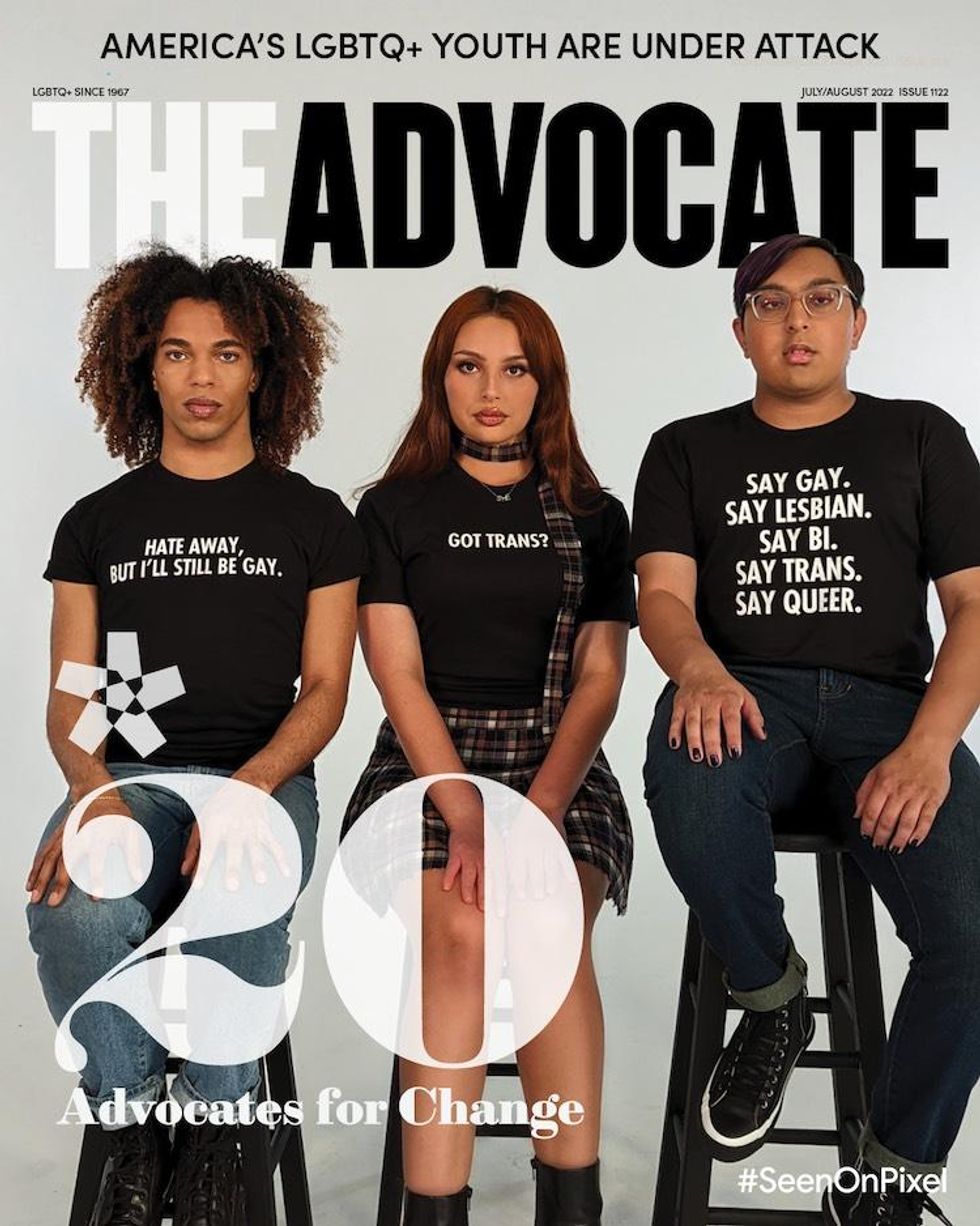
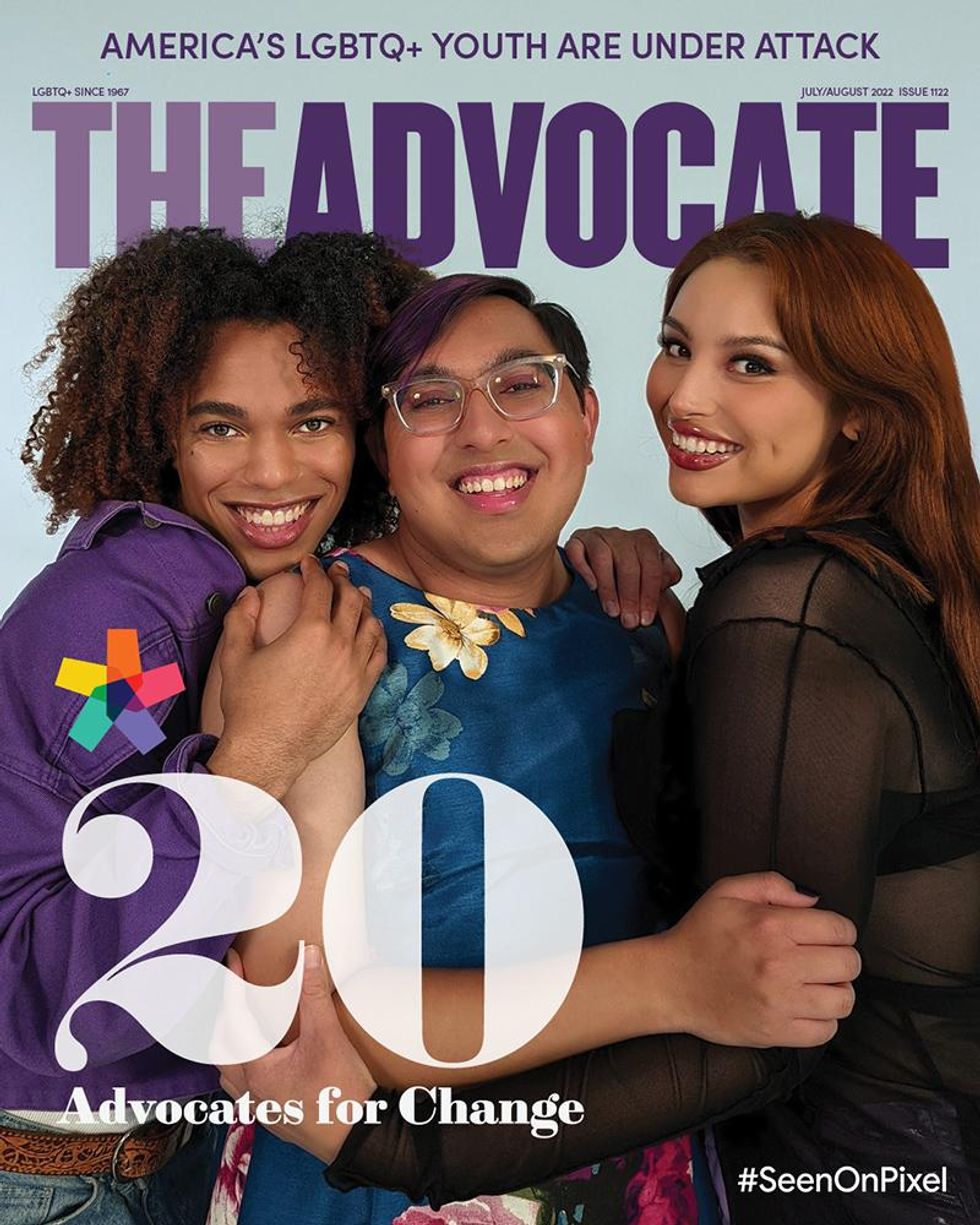
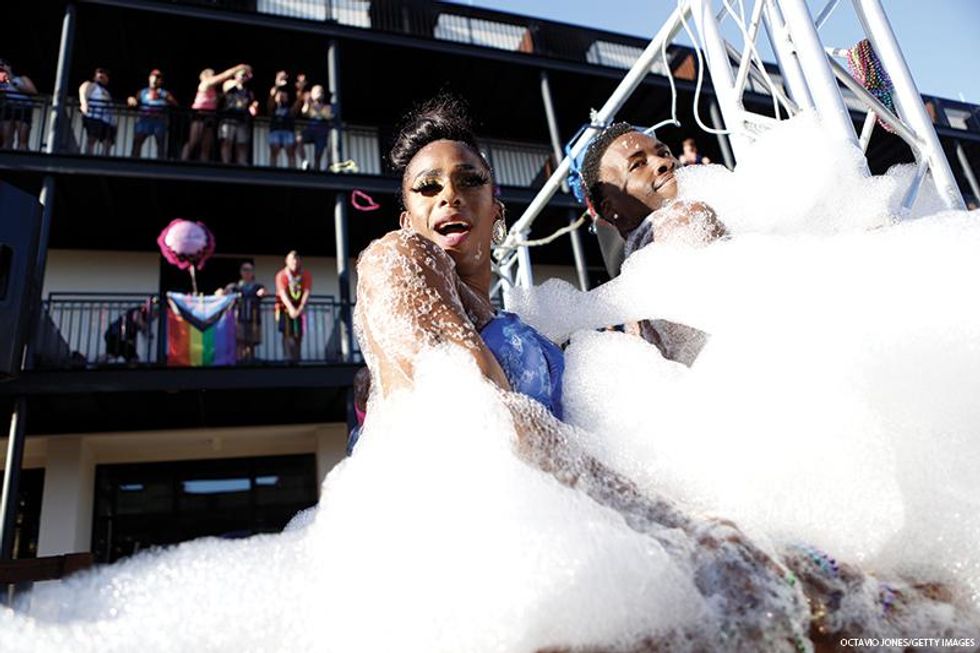
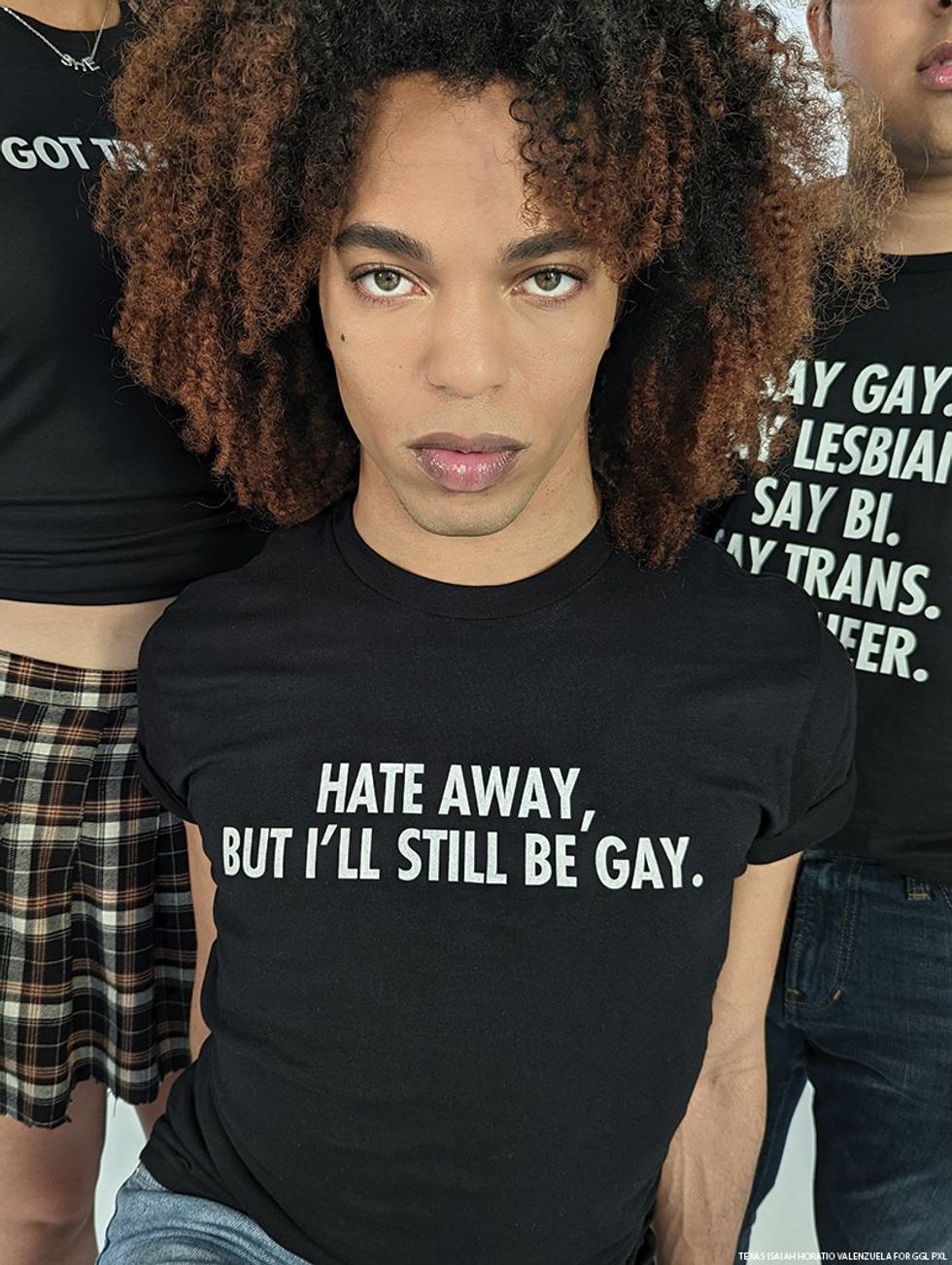
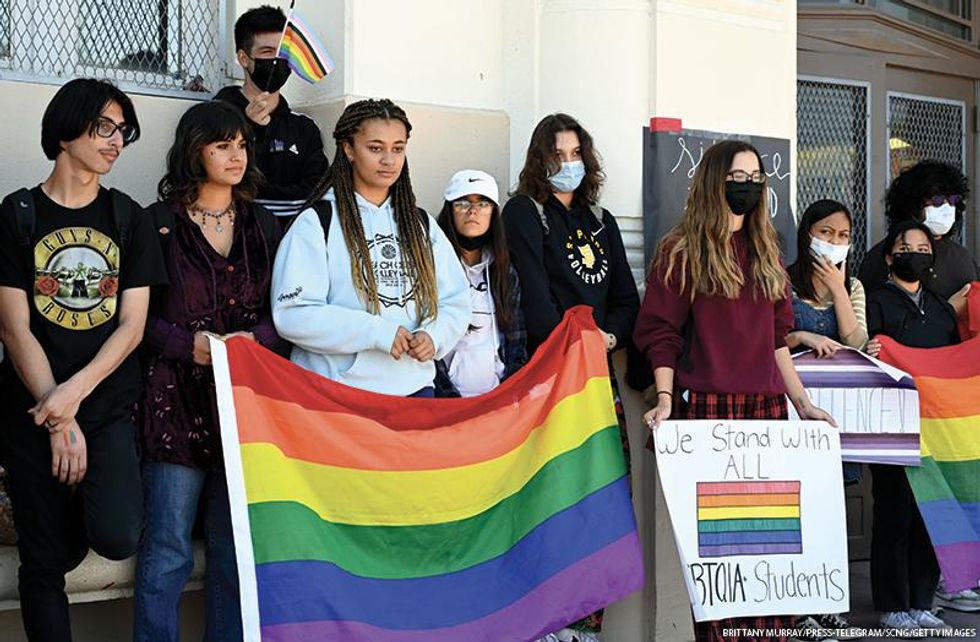
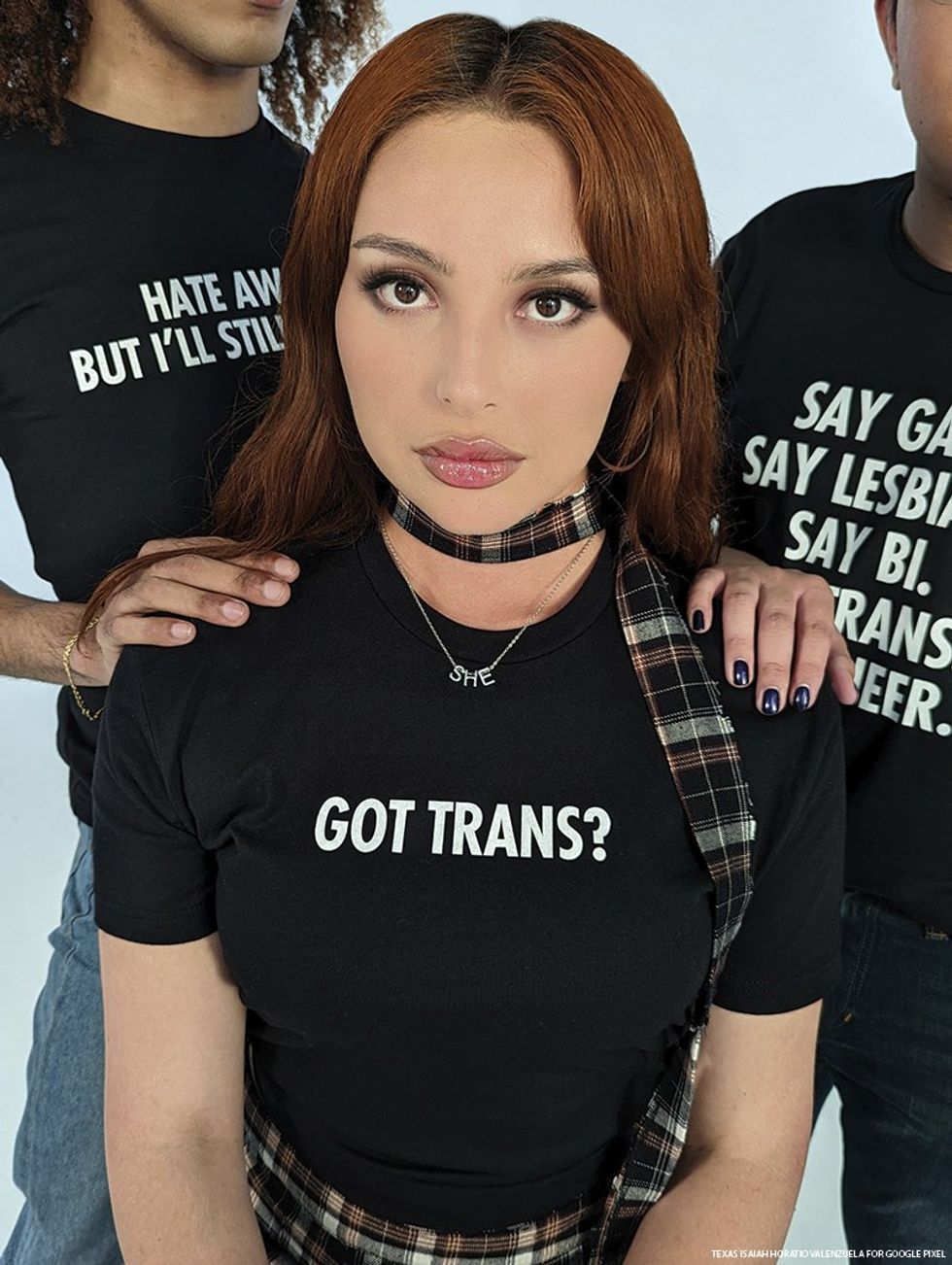
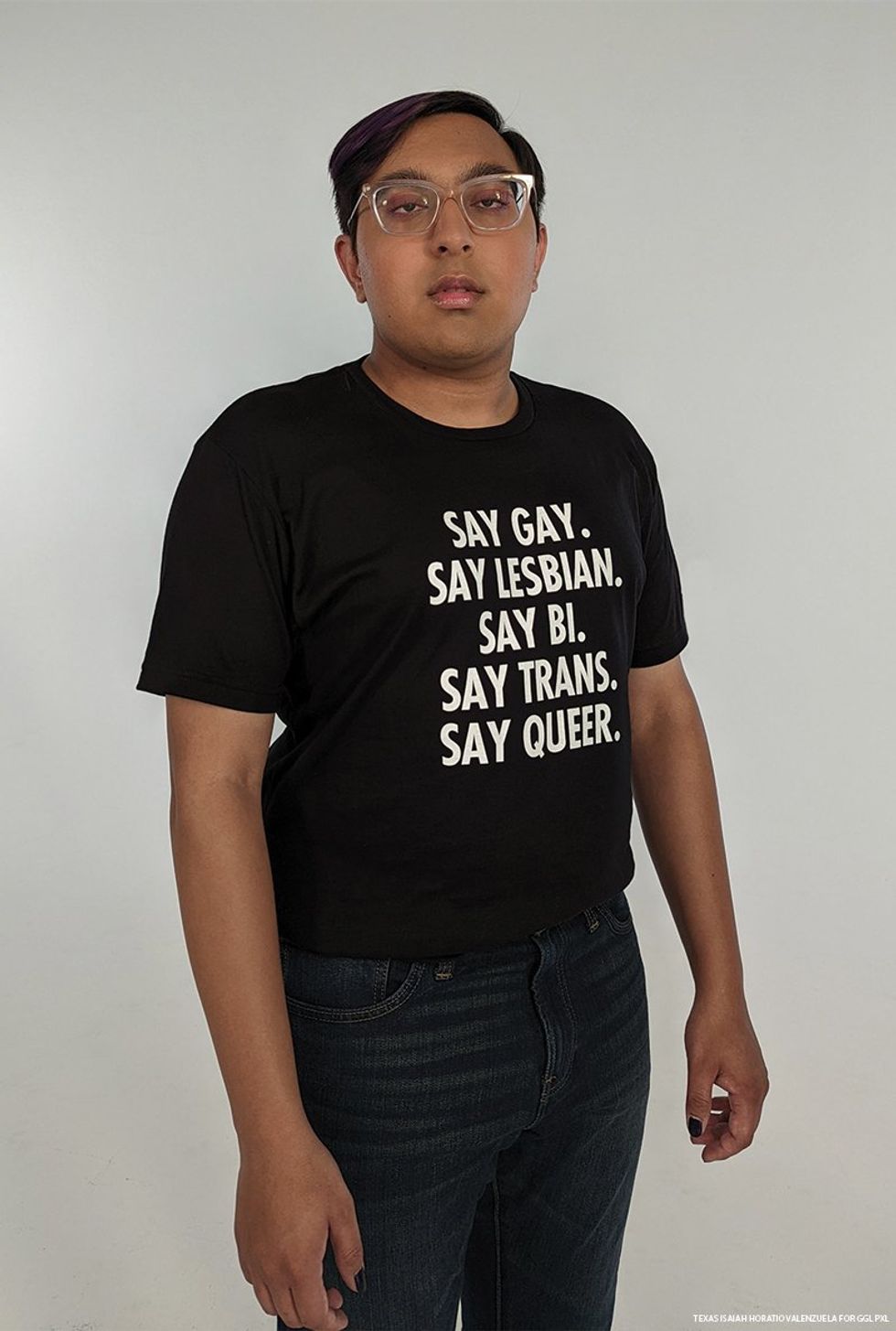
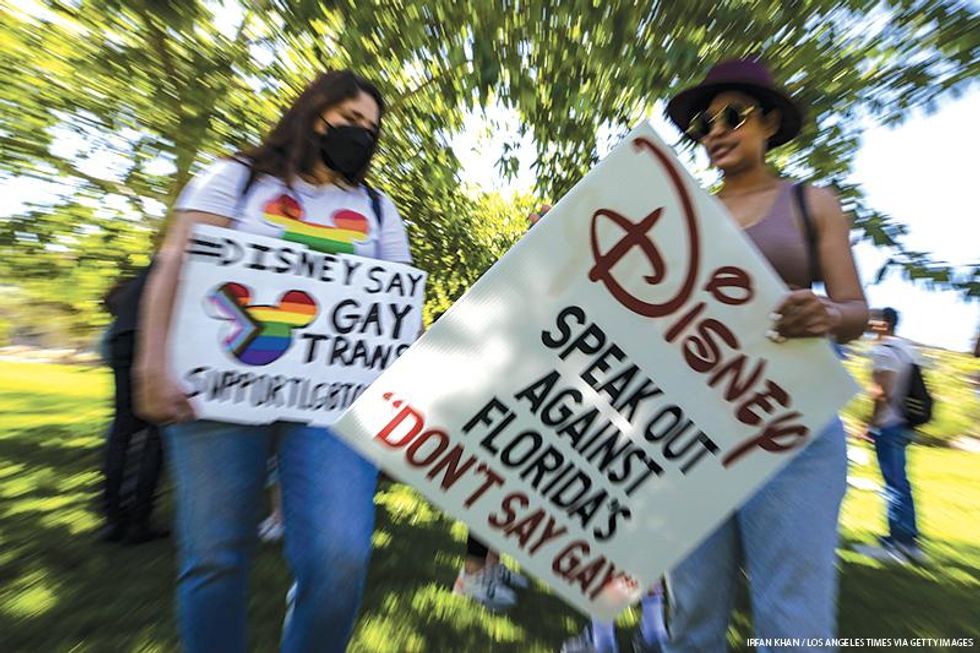
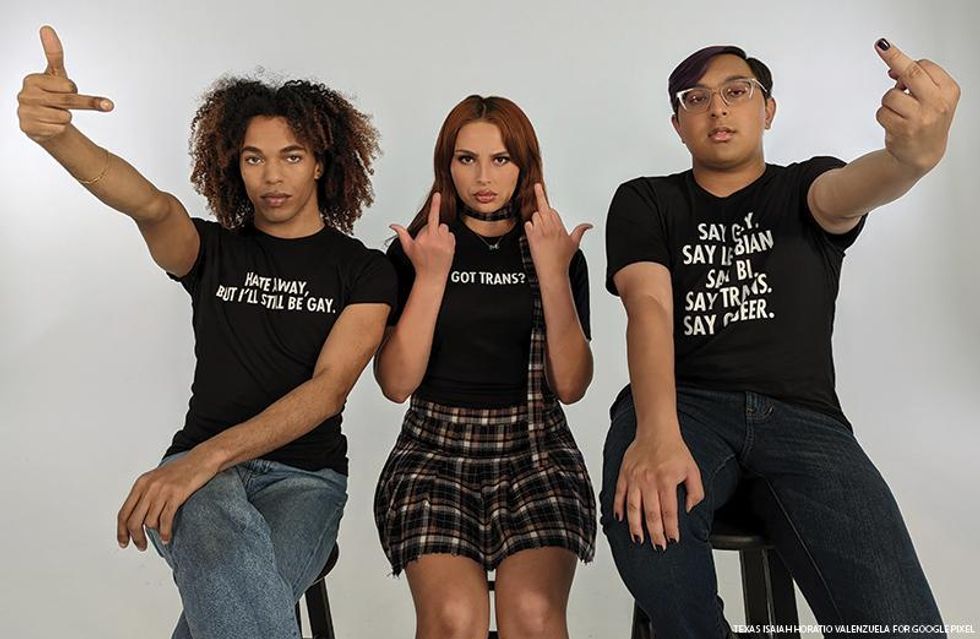



































































Charlie Kirk DID say stoning gay people was the 'perfect law' — and these other heinous quotes